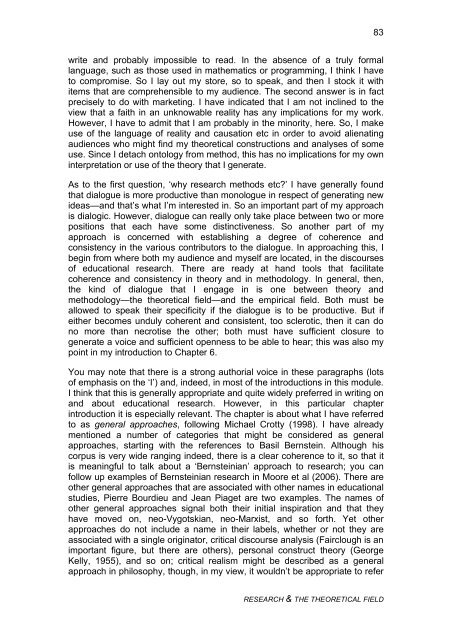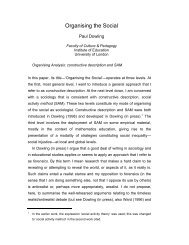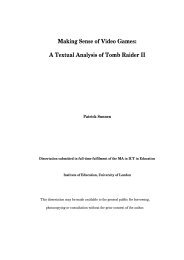Research and the Theoretical Field - Pauldowling.me
Research and the Theoretical Field - Pauldowling.me
Research and the Theoretical Field - Pauldowling.me
You also want an ePaper? Increase the reach of your titles
YUMPU automatically turns print PDFs into web optimized ePapers that Google loves.
83<br />
write <strong>and</strong> probably impossible to read. In <strong>the</strong> absence of a truly formal<br />
language, such as those used in ma<strong>the</strong>matics or programming, I think I have<br />
to compromise. So I lay out my store, so to speak, <strong>and</strong> <strong>the</strong>n I stock it with<br />
items that are comprehensible to my audience. The second answer is in fact<br />
precisely to do with marketing. I have indicated that I am not inclined to <strong>the</strong><br />
view that a faith in an unknowable reality has any implications for my work.<br />
However, I have to admit that I am probably in <strong>the</strong> minority, here. So, I make<br />
use of <strong>the</strong> language of reality <strong>and</strong> causation etc in order to avoid alienating<br />
audiences who might find my <strong>the</strong>oretical constructions <strong>and</strong> analyses of so<strong>me</strong><br />
use. Since I detach ontology from <strong>me</strong>thod, this has no implications for my own<br />
interpretation or use of <strong>the</strong> <strong>the</strong>ory that I generate.<br />
As to <strong>the</strong> first question, ‘why research <strong>me</strong>thods etc’ I have generally found<br />
that dialogue is more productive than monologue in respect of generating new<br />
ideas—<strong>and</strong> that’s what I’m interested in. So an important part of my approach<br />
is dialogic. However, dialogue can really only take place between two or more<br />
positions that each have so<strong>me</strong> distinctiveness. So ano<strong>the</strong>r part of my<br />
approach is concerned with establishing a degree of coherence <strong>and</strong><br />
consistency in <strong>the</strong> various contributors to <strong>the</strong> dialogue. In approaching this, I<br />
begin from where both my audience <strong>and</strong> myself are located, in <strong>the</strong> discourses<br />
of educational research. There are ready at h<strong>and</strong> tools that facilitate<br />
coherence <strong>and</strong> consistency in <strong>the</strong>ory <strong>and</strong> in <strong>me</strong>thodology. In general, <strong>the</strong>n,<br />
<strong>the</strong> kind of dialogue that I engage in is one between <strong>the</strong>ory <strong>and</strong><br />
<strong>me</strong>thodology—<strong>the</strong> <strong>the</strong>oretical field—<strong>and</strong> <strong>the</strong> empirical field. Both must be<br />
allowed to speak <strong>the</strong>ir specificity if <strong>the</strong> dialogue is to be productive. But if<br />
ei<strong>the</strong>r beco<strong>me</strong>s unduly coherent <strong>and</strong> consistent, too sclerotic, <strong>the</strong>n it can do<br />
no more than necrotise <strong>the</strong> o<strong>the</strong>r; both must have sufficient closure to<br />
generate a voice <strong>and</strong> sufficient openness to be able to hear; this was also my<br />
point in my introduction to Chapter 6.<br />
You may note that <strong>the</strong>re is a strong authorial voice in <strong>the</strong>se paragraphs (lots<br />
of emphasis on <strong>the</strong> ‘I’) <strong>and</strong>, indeed, in most of <strong>the</strong> introductions in this module.<br />
I think that this is generally appropriate <strong>and</strong> quite widely preferred in writing on<br />
<strong>and</strong> about educational research. However, in this particular chapter<br />
introduction it is especially relevant. The chapter is about what I have referred<br />
to as general approaches, following Michael Crotty (1998). I have already<br />
<strong>me</strong>ntioned a number of categories that might be considered as general<br />
approaches, starting with <strong>the</strong> references to Basil Bernstein. Although his<br />
corpus is very wide ranging indeed, <strong>the</strong>re is a clear coherence to it, so that it<br />
is <strong>me</strong>aningful to talk about a ‘Bernsteinian’ approach to research; you can<br />
follow up examples of Bernsteinian research in Moore et al (2006). There are<br />
o<strong>the</strong>r general approaches that are associated with o<strong>the</strong>r na<strong>me</strong>s in educational<br />
studies, Pierre Bourdieu <strong>and</strong> Jean Piaget are two examples. The na<strong>me</strong>s of<br />
o<strong>the</strong>r general approaches signal both <strong>the</strong>ir initial inspiration <strong>and</strong> that <strong>the</strong>y<br />
have moved on, neo-Vygotskian, neo-Marxist, <strong>and</strong> so forth. Yet o<strong>the</strong>r<br />
approaches do not include a na<strong>me</strong> in <strong>the</strong>ir labels, whe<strong>the</strong>r or not <strong>the</strong>y are<br />
associated with a single originator, critical discourse analysis (Fairclough is an<br />
important figure, but <strong>the</strong>re are o<strong>the</strong>rs), personal construct <strong>the</strong>ory (George<br />
Kelly, 1955), <strong>and</strong> so on; critical realism might be described as a general<br />
approach in philosophy, though, in my view, it wouldn’t be appropriate to refer<br />
RESEARCH & THE THEORETICAL FIELD




